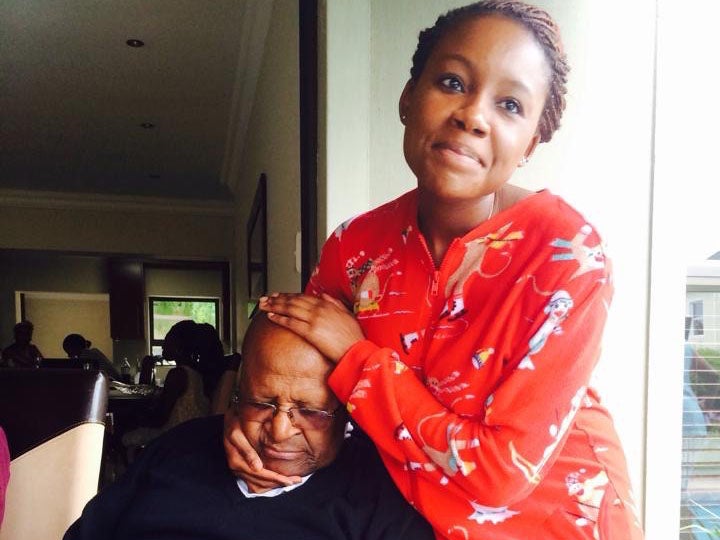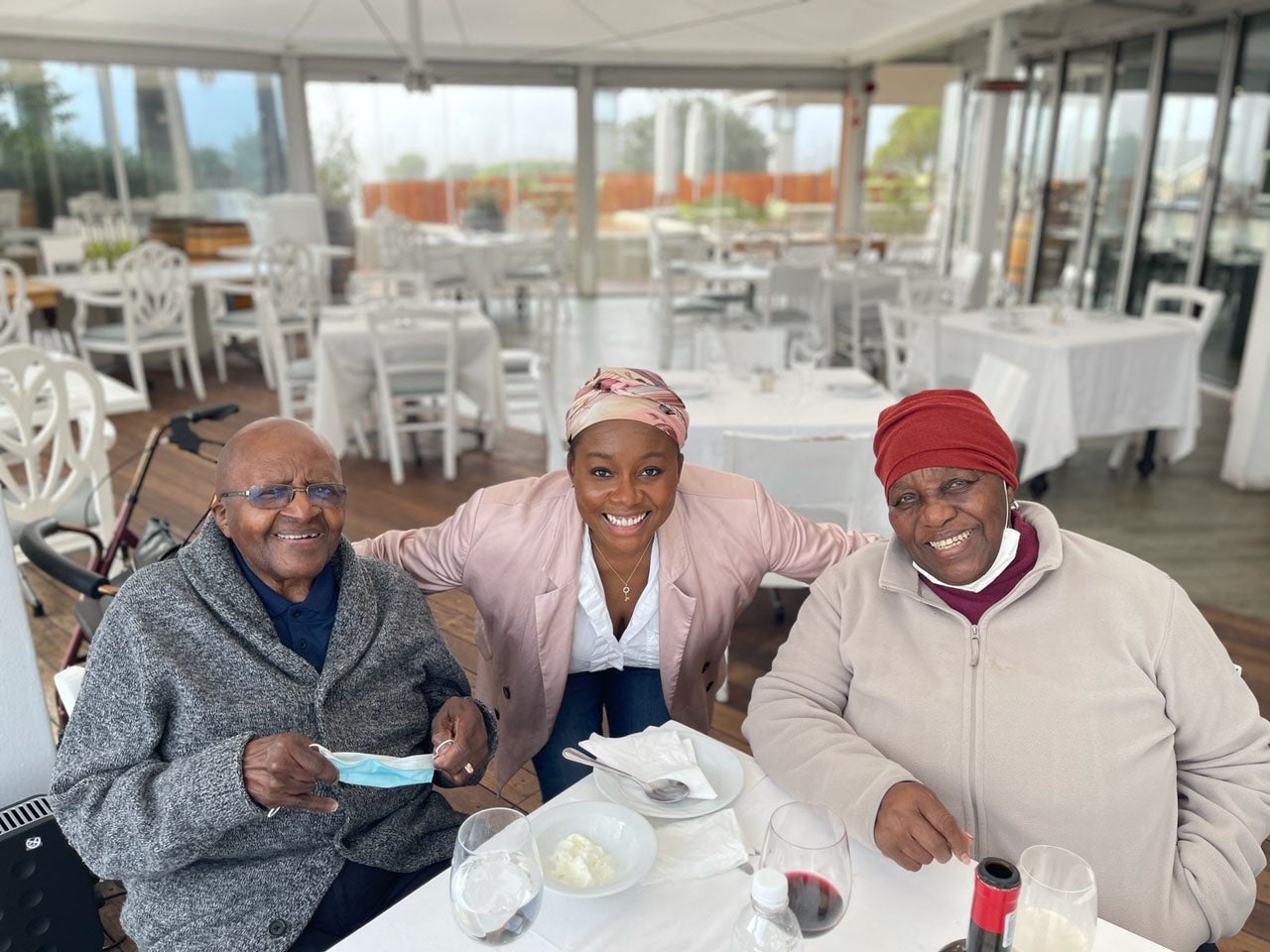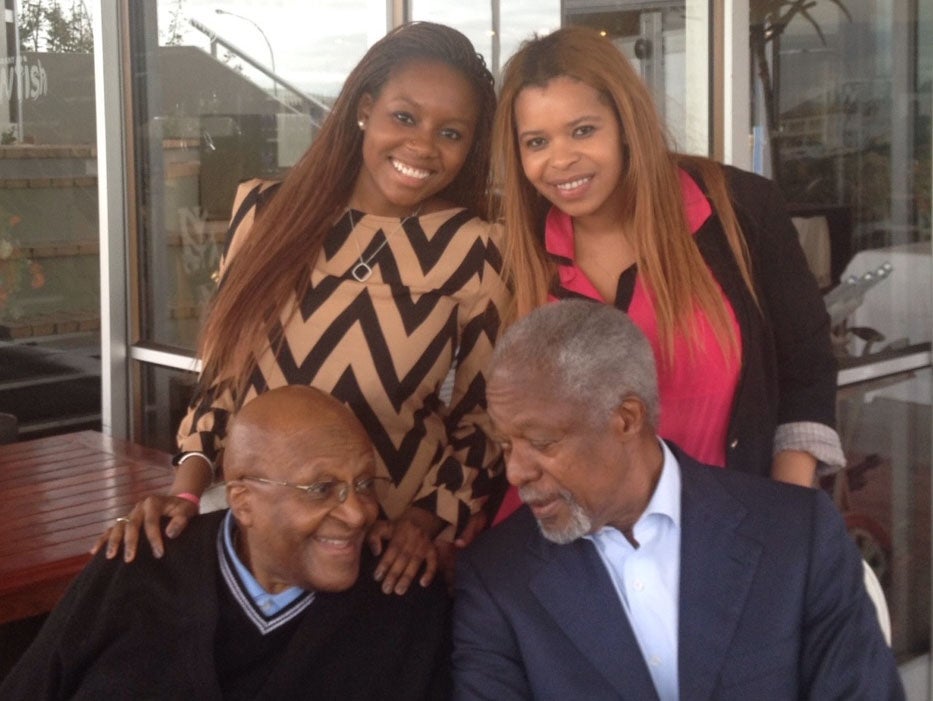‘To me, he was Khulu’: This is how I remember my grandfather, Desmond Tutu
He was a moral compass for the world. We made him our sun, and now our orbit is off


I’ve never lived in a world where Desmond Tutu did not exist, where Khulu (short for ‘tatamkhulu’ which means ‘grandfather’ in Xhosa) was someone we spoke of in the past tense.
The first thing I did after I found out that my grandfather died was laundry. Trust me, I know this sounds odd, but at the time, I was so far away from my family and the only thing I could think to do was to prepare for our trip. Going into productive mode may sound like a peculiar go-to, but that was how my grief initially manifested.
My tear ducts seemed non-existent during the initial 20 hours after hearing the news. I knew that he was dying and that it would happen at some point soon. He had long suffered complications from prostate cancer. But still, I was stunned, and could do nothing but laundry.
Those tears eventually came when I was packing and found photos of us together. I was trying to find clothing for the funeral that would cover my shoulders, my knees and my head, as per Xhosa tradition. In the comfort of my closet, the night before I left for South Africa, I was finally able to cry.
Usually, when a family member dies, you have to do the rounds to tell the appropriate people: colleagues, friends, distant relatives. In this situation, I didn’t have to tell anyone. An hour into said laundry, the floods of emails and texts began. Two emails and five texts soon became seven emails and 23 texts. I felt lucky to have so many people sharing their well wishes, but as an empath, I soaked up everything that everyone was feeling.
I wanted to thank people for their messages in a timely manner, but I also wanted to be present for my family. I wanted to talk to my friends about the things happening in their lives but I could not pretend that everything was normal. I wanted to fulfil work obligations I had but I could not focus. I kept sleeping and yet I kept waking up exhausted.
Years ago, I discovered I was a plane crier. People say there is something about the altitude that makes some of us prone to crying in those tin boxes, high in the sky. With this in mind, I was anxious that tears would make an appearance in the air, but they stayed at bay. We landed in South Africa and the grief struck again. Everyone around me was mourning in their own way. My family was everywhere I turned, and visitors kept showing up to pay their respects. I am not a hugger, and there were many hugs. Hugs, handshakes, elbow taps (thank you Covid), nods and acknowledging silence.

Lack of control is omnipresent in grief. My therapist has tried to remind me that accepting that someone has gone does not mean that we find it acceptable. Sitting on my flight back to America, it felt as though the act of leaving South Africa was an act of acceptance. During my trip, I had been avoiding “normal life” and had not accepted that Khulu was no longer here. It’s like that first moment you realise you’ve moved from the present tense to the past tense. From “he always laughs at his own jokes before he delivers the punchline” to “he always laughed at his own jokes”. It feels awkward, uncomfortable and somewhat of a betrayal.
Grieving is split into two near-equal parts: being overwhelmingly aware of your emotions while simultaneously being on auto-pilot to make it through the day. It’s similar to the brain fog I felt the first time I had Covid, and is a wholly non-linear process – one minute you feel like you have it under control, then their favourite song plays, or they are referred to as “the late” and you’re thrown for a loop. At the beginning, grief feels like a heavy suitcase, weighing you down, leaving you out of breath, but over time it becomes a small purse that you carry everywhere.
To keep up to speed with all the latest opinions and comment sign up to our free weekly Voices Dispatches newsletter by clicking here
My mamkhulu (aunt) took a phone call in the midst of funeral planning where I assume someone asked how she was doing, because her response was: “I’ve known myself to be better.” I’ve found comfort in that reply in recent months. I have indeed known myself to be better, because I am embarking on a life without the presence of Khulu. I am just meeting the Mungi that is here today without her grandfather. Those around us experiencing grief may be navigating life for the first time without their loved one. They’re learning a new language.
People do odd things in the midst of grief. And this reality is magnified when you are grieving someone in the public eye. The spotlight that was shone on my grandfather’s life and death has interfered with my family’s grief. I can imagine my grandfather scolding us for getting our feathers ruffled, instead of extending grace to those who have sown discord. He would say, “Hayi nina!”, meaning “No, stop it you all!” We could all extend more grace in grief, myself included. We will all have grief to contend with one day.

I spent a few days prior to writing this thinking about how I can honour his legacy. And while tweeting Allan Dershowitz after he called my grandfather an antisemite for his views on Palestine felt good in the moment, it is not what will bring about the Palestinian liberation my grandfather advocated for.
I know that, like my grandfather, I will not shut up about injustice. I also know that I do not have to decide how to continue his legacy right away. I’m allowed to sit in grief and not act. In the west, grief is meant to be “handled” once the funeral happens, but that’s when the real grieving process begins. We must learn to take our time – I am taking mine.
Khulu was a moral compass for the world. He was the social conscience of South Africa. He was our family’s centre. Knowingly (and unknowingly), we made him our sun, and now our orbit is off. Everyone who is trying to move forward feels a bit off-kilter. Discovering who we each are without comparing ourselves to Desmond Tutu, we are now forced to confront a new reality of our own.
Though small of stature, his presence loomed large, larger than life. We will always remember him being the first to get up and dance. We will continue to roll our eyes at the jokes he told over and over again. We will laugh about how his response to messages about the planning of his memorial was: “Sounds lovely, wish I could be there!” We will smile each time a stranger shares the impact he had on their life. And we will remember that if he was watching us now he would ask why we were so sad and weeping.
My grandfather once said: “Life is more than breath and a heartbeat; meaning and purpose are the life of life,” and never has something felt so true. Just because he is out of sight does not mean he is ever out of mind.
Join our commenting forum
Join thought-provoking conversations, follow other Independent readers and see their replies
Comments
Bookmark popover
Removed from bookmarks